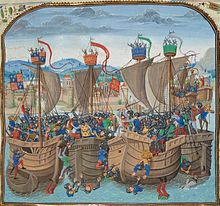Hundred Years' War


The Hundred Years' War (French: Guerre de Cent Ans; 1337–1453) was a series of armed conflicts fought between the kingdoms of England and France during the Late Middle Ages. It originated from English claims to the French throne. The war grew into a broader power struggle involving factions from across Western Europe, fueled by emerging nationalism on both sides. The periodization of the war takes place over 116 years, wherein the war was interrupted by several years of truces.
The Hundred Years' War was a significant conflict in the Middle Ages. During the war, five generations of kings from two rival dynasties fought for the throne of France, which was then the dominant kingdom in Western Europe. The war had a lasting effect on European history. Both sides produced innovations in military technology and tactics, including professional standing armies and artillery, that permanently changed European warfare; chivalry, which reached its height during the conflict, subsequently declined. Stronger national identities took root in both countries, which became more centralized and gradually rose as global powers.
Quotes
[edit]- In the XXI. yere, whan Kyng Philip of Frauns was fled thus cowardly fro the sege of Caleys, thei of the same town offered the town to Kyng Edward withoute any poyntment. And he lay in the town a month, considering the strong disposicion thereof. Thanne, at instauns of the Pope, was taken trews betwix the two Kyngis for a yere.
- John Capgrave, The Chronicle of England, on the siege of Calais in 1347
- Christine de Pizan argued passionately for the need to resolve the conflict, stating that 'Every kingdom divided in itself will be destroyed, and every city or house divided against its own good cannot endure.'
- Christine de Pizan, quoted by David Green, The Hundred Years War: A People's History (2014)
- Compare: Omne regnum divisum contra se desolatur et omnis civitas vel domus divisa contra se non stabit.
- Eche kyngdam departid aȝeins hym self, shal be desolat, or discounfortid, and eche citee, or hous, departid aȝeins it self, shal nat stonde.
- ‘Poitiers and Cressy tell,
When most their pride did swell,
Under our swords they fell:
No less our skill is
Than when our grandsire great,
Claiming the regal seat,
By many a warlike feat
Lopp’d the French lilies.’- Michael Drayton, "Ballad of Agincourt" (1619)
- The battle was "fierce and terrible," reports Froissart, "for battles on sea are more dangerous and fiercer than battles by land, for on the sea there is no recoiling or fleeing." Under the archers' attack the French were driven from the decks and, pursued by ill-luck and error, were engulfed in defeat.No one dared tell the outcome of the battle to Philip VI until his jester was thrust forward and said, "Oh, the cowardly English, the cowardly English!" and on being asked why, replied, "They did not jump overboard like our brave Frenchmen." The King evidently got the point. The fish drank so much French blood, it was said afterward, that if God had given them the power of speech they would have spoken in French.
- Jean Froissart, Chroniques (1369–1400), quoted by Barbara W. Tuchman, A Distant Mirror (1978), on the sea fight at Sluys in 1340
- The most lasting and significant consequences of the war should be sought, perhaps, in the sphere of national psychology... For the victories were the victories, not only of the king and the aristocracy, but of the nation. The debt of the knightly classes to the skill and endurance of the common men who wielded the longbows and manned the ships was plain for all to see. War might be the sport of kings, but it was a sport from which the burgess, the yeoman, and the peasant were not shut out. National pride was no new phenomenon in the fourteenth century; but Sluys and Crécy, Poitiers and Nájera sowed the seeds of that confidence in the invincibility of England which was to sustain the spirit of her people through the darkest hours of many future wars.
- May McKisack, The Fourteenth Century, 1307–1399 (1959), pp. 150-151
- Throughout history, security as much as status has been an obstacle to summitry. In 1419 France was in turmoil from war with the English and a power struggle provoked by the periodic insanity of King Charles VI. On September 10 the dauphin, Charles’ son, conferred on a bridge near Rouen with their archrival, John, Duke of Burgundy. Both men were well attended by guards and a barrier had been erected in the middle, with a wicket gate bolted on either side to allow passage only by mutual consent. During the conference Duke John was persuaded to come through the gate—only to be cut down by the dauphin’s bodyguard. The dauphin, inheriting the throne as Charles VII, recovered much of France from the English. When his son, Louis XI, met the Yorkist king Edward IV at Picquigny near Amiens in 1475 to conclude a peace treaty, the fate of Duke John was much in mind. The chronicler Philippe de Commines tells how this conference was held on a bridge over the Somme. Louis insisted that across the middle of the bridge and along its sides his carpenters should build “a strong wooden lattice, such as lions’ cages are made with, the hole between each bar being no wider than to thrust in a man’s arm.” The two kings somehow managed to embrace between the holes and conducted their meeting in secure cordiality.
- David Reynolds, Summits: Six Meetings that Changed the Twentieth Century (2007), p. 15
- War without fire is worth nothing—like sausages without mustard.
- Jean Juvénal des Ursins, Charles V, Histoire de Charles VI, Roy de France, p. 565; perhaps quoting Henry V, on the firing of Meaux in 1421
- Richard Vaughan & Graeme Small, Philip the Good: The Apogee of Burgundy (2002), p. 11
- Compare: Chevauchée

